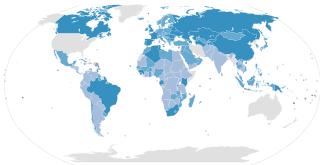| C96 | |
|---|---|
| ILO Convention | |
| Date of adoption | June 1, 1949 |
| Date in force | July 18, 1951 |
| Classification | Employment Services - Job Placement |
| Subject | Employment policy and Promotion |
| Previous | Protection of Wages Convention, 1949 |
| Next | Migration for Employment Convention (Revised), 1949 |
Fee-Charging Employment Agencies Convention (Revised), 1949 is an International Labour Organization Convention.
It was established in 1949, with the preamble stating:
Having decided upon the adoption of certain proposals with regard to the revision of the Fee-Charging Employment Agencies Convention, 1933,..
The convention is a revision of ILO Convention C34, Fee-Charging Employment Agencies Convention, 1933 (shelved).
As of 2023, 42 states have ratified the convention. However, 20 of these states have subsequently denounced the convention, with some doing so through an automatic process that denounces the 1949 convention upon the ratification of a superseding convention.

The ILO Convention Concerning Minimum Age for Admission to Employment C138, is a convention adopted in 1973 by the International Labour Organization. It requires ratifying states to pursue a national policy designed to ensure the effective abolition of child labour and to raise progressively the minimum age for admission to employment or work. It is one of eight ILO fundamental conventions. Convention C138 replaces several similar ILO conventions in specific fields of labour.
Maternity Protection Convention, 1919 is an International Labour Organization Convention.
Placing of Seamen Convention, 1920 is an International Labour Organization Convention.
Workmen's Compensation Convention, 1925 is an International Labour Organization Convention.
Protection against Accidents (Dockers) Convention (Revised), 1932 is an International Labour Organization Convention.
Fee-Charging Employment Agencies Convention, 1933 (shelved) is an International Labour Organization Convention.
Seafarers' Annual Leave with Pay Convention, 1976 is an International Labour Organization Convention.
The Convention concerning Hours of Work on Board Ship and Manning or Hours of Work and Manning (Sea) Convention, 1936 is an International Labour Organization Convention which never entered into force. It was established in 1936, and closed for ratification on 24 February 2002, when the 1996 Convention concerning Seafarers' Hours of Work and the Manning of Ships entered into force.
Migration for Employment Convention (Revised), 1949 is an International Labour Organization Convention for migrant workers.
Accommodation of Crews Convention (Revised), 1949 is an International Labour Organization Convention.
Labour Clauses Convention, 1949 is an International Labour Organization (ILO) Convention adopted in Geneva on 29 June 1949. Its preamble states:
Having decided upon the adoption of certain proposals concerning labour clauses in public contracts ....
Continuity of Employment (Seafarers) Convention, 1976 is an International Labour Organization Convention.
Repatriation of Seafarers Convention (Revised), 1987 is an International Labour Organization Convention.
Private Employment Agencies Convention, 1997 is an International Labour Organization Convention.

An employment agency is an organization which matches employers to employees. In developed countries, there are multiple private businesses which act as employment agencies and a publicly funded employment agency.

The Employment Agencies Act 1973 is a United Kingdom act of Parliament and part of a wider body of UK agency worker law. It regulates the conduct of employment agencies which recruit and manage temporary and permanent labour. It applies to approximately 17,000 employment agencies operating in the UK. It was introduced by a private member's bill by Kenneth Lewis, member of parliament for Rutland and Stamford.
Adams v. Tanner, 244 U.S. 590 (1917), was a United States Supreme Court case in which the Court held that a Washington state law that prohibited employment agencies was unconstitutional.
Agency worker law refers to a body of law which regulates the conduct of employment agencies and the labour law rights of people who get jobs through them. The typical situation involves the person going to an employment agency and then the employment agency sending the person to an actual employer for proper work.

The Maritime Labour Convention (MLC) is an International Labour Organization (ILO) convention, number 186, established in 2006 as the fourth pillar of international maritime law and embodies "all up-to-date standards of existing international maritime labour Conventions and Recommendations, as well as the fundamental principles to be found in other international labour Conventions". The other pillars are the SOLAS, STCW and MARPOL. The treaties applies to all ships entering the harbours of parties to the treaty (port states), as well as to all ships flying the flag of state party (flag states, as of 2021: over 91 per cent).